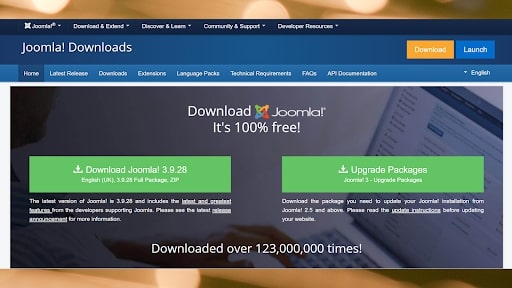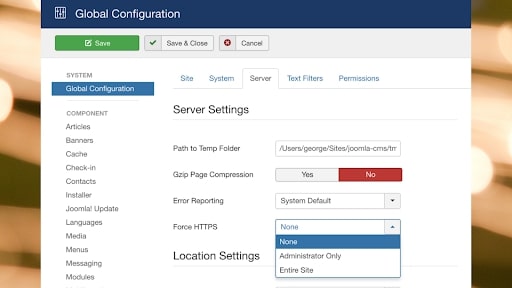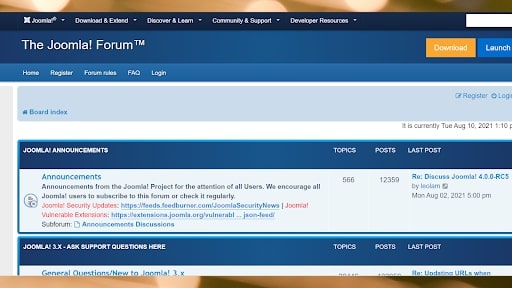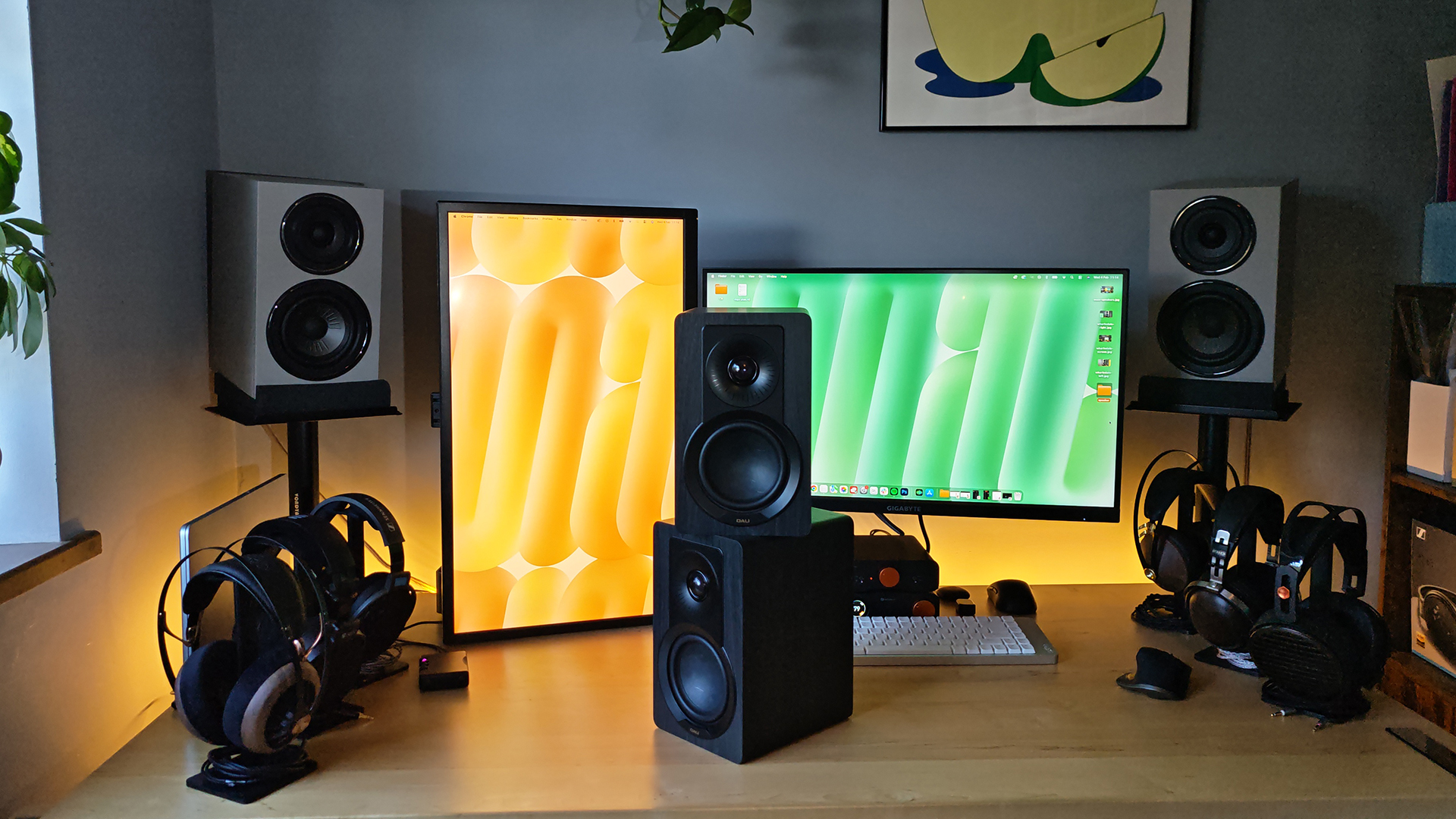Our Verdict
A free and open-source CMS, Joomla offers useful out-of-the-box tools, a variety of extensions, and great design flexibility. Beginner site builders, however, may be intimidated by its complicated interface and steep learning curve.
For
- Free and open-source
- Comprehensive knowledge base
- Flexible and customizable design
Against
- Complicated backend dashboard
- No email, phone, live chat support
Why you can trust Creative Bloq
If you’ve been trying to find the best website builder on the market, you may have come across Joomla, an open-source platform that powers over two million websites worldwide. It is more akin to WordPress.org than an all-in-one service such as Wix or Squarespace, being a content management system (CMS) that requires you to organise your own web hosting and domain name before you can create a website. This makes it more challenging for beginners, but offers greater flexibility and customisation for those who are willing to make the leap.
In this Joomla review, we’ll provide essential information about this CMS to help you decide if it’s suitable for your site-building needs.
Joomla review: plans and pricing
As an open-source CMS, Jooma is free to download and use. You’ll be able to build and modify your site with open-source code and free plugins and templates. If you’re not satisfied with the free-to-use options, you can purchase paid plugins and templates for your site.
Like Joomla, WordPress, another popular CMS, is free to use. You should, however, know that with a CMS, you will have to pay for a custom domain name ($0.99 to $16.99/year), hosting (from $5 to $50/month) and other design and development costs.
If an all-in-one package sounds more appealing to you, website builders like Wix offer pricing plans ($4.50 to $35/month) which include essentials like hosting, e-commerce features, themes, apps, and customer support.

Joomla review: features
In this section, we look at some of Joomla’s defining features.
Design and templates
Daily design news, reviews, how-tos and more, as picked by the editors.
Even though Joomla doesn’t have an official template library, you can easily find templates on third-party sites. Whether you’re building an e-commerce, portfolio, or personal website, these templates make design and customization a breeze. Uniquely, on Joomla you can use different templates for different pieces of content. Users can therefore feature multiple templates on a single website—a feature that is missing on WordPress.
Extensions and plugins
On Joomla’s website, you’ll find a library of more than 5,000 extensions (or plugins). These extensions can enhance the functionality of your site without you having to touch code. On Joomla’s site, extensions are categorized neatly into sections like Social Media, Billing, Contact Forms, Blog, and more. Creatives will find Joomla’s testimonial extensions particularly useful, which you can use to display and manage how you’d like your clients’ testimonials to look on your site.
Furthermore, because of Joomla's open-source nature, anyone can create an extension or template, so you’ll be greeted with new ones periodically. This also means, however, that you may have to tackle compatibility issues from time to time.
Search engine optimization (SEO)
If you’re keen to rank highly on search engines, you’ll be glad to know that SEO is built right into Joomla. With Joomla’s powerful SEO tools, you can enable SEO-friendly URLs to make them catchy for visitors and web crawling bots.
Each menu item that you add on your site can also have its own meta description, keywords, and title tags for even greater searchability and consistency.
Joomla Review: interface
Getting started with Joomla is easy—simply download and run the software or launch a website straight from Joomla’s site. The challenge comes when you interact with Joomla’s backend editor and dashboard to build and maintain your site. For beginner site-builders and those unfamiliar with using a CMS, the dashboard with its multiple admin panels and tabs may seem intimidating.
Moreover, Joomla uses Articles and Categories to organize a site. So before you create any content (Articles), you’ll have to create Categories for the different types of content that you wish to publish. If your site features multiple types of content, this process can be time-consuming. Fortunately, this only occurs during the initial set-up process. After you have created a list of categories that your site would feature, you can easily add articles into their respective categories.
Joomla review: security
For its users, Joomla offers Joomla Force SSL, a built-in security feature that allows users to activate a Secure Sockets Layer (SSL) certificate on their site without the need to install an extra extension. As a digital passport that protects the confidentiality of communication with browsers, SSL certificates are crucial for security and privacy.
Additionally, because SSL certification is mandatory for PCI compliance (a set of rules that businesses follow to secure and protect credit card data), Joomla Force SSL will be greatly appreciated by business owners dealing with payment gateways.
For even more layers of security, check out Joomla’s security extensions, which include anti-spam and Captcha plugins.

Joomla review: support
With Joomla you won’t be able to speak to customer support representatives via email, live chat, or phone. Instead, its website features a community portal and a forum, both of which are active. On the former, you’ll find blogs and useful how-to videos to help you get started. The latter, on the other hand, is a platform for you to interact with other users and learn about Joomla’s recent announcements and updates.

Is Joomla for you?
With useful out-of-the-box tools, a variety of extensions, and the option to flaunt your coding skills to enhance your site, Joomla is a CMS worth considering. But if having the luxury of choice is important to you, WordPress, a free-to-use CMS with over 11,000 themes and more than 50,000 plugin extensions, is your best bet.
Even though Joomla and WordPress offer extensions that enable you to build a site without any coding skills, having some technical know-how will help you navigate the two systems’ rather complicated backend editors. Beginners will have to spend some time getting used to them.
If you’d like to avoid that, consider a website builder like Wix. With Wix’s Artificial Design Intelligence (ADI) tool, a personalized site can be created for you after you answer questions about its style, type, and purpose. That said, with Wix, you’ll have to forgo the flexibility and customization that Joomla offers.
Related articles:
out of 10
A free and open-source CMS, Joomla offers useful out-of-the-box tools, a variety of extensions, and great design flexibility. Beginner site builders, however, may be intimidated by its complicated interface and steep learning curve.

Joanna is a freelance writer based in Singapore, with a background in Sociology and a keen interest in technology. A seasoned and passionate writer, Joanne has worked with such global publications as TechRadar, Tom's Guide and more. When she's not writing, she's usually binge-watching trashy reality shows on Netflix.

